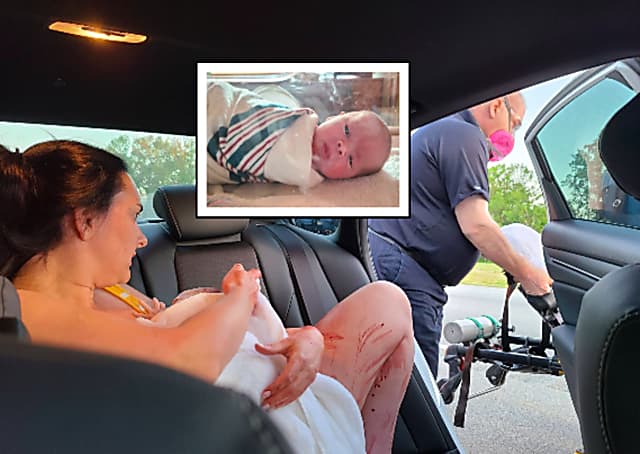Emily Hardman had a general idea of how she wanted her second child to be born: vaginally and without medication.
Last Saturday morning, the talented opera singer received just that. The only problem was that she wasn’t giving birth in a hospital with midwives and a doula.
She was in the backseat of her family’s Honda Accord on Route 78 in New Jersey, led only by a meditation app and cues from her own body, with her husband Travis Hardman at the wheel.
Rosemary Claire Hardman, a baby girl, was born at milepost 20.2 on the eastbound side of the highway in Lebanon on May 15 at 5:47 a.m. Her mother made it look easy.
“It went from ‘Pull over’… to ‘There’s a girl’ in less than a minute,” the 35-year-old mother told Daily Voice from her Briarcliff Manor, NY home on Thursday.
“It felt liberating. I did it on my own. But for the venue and suppliers, I got much of what was on my birth plan.”
Since her son, Wesley, was born via planned C-section in 2018, Emily had been preparing for a Vaginal Birth After Cesarean (VBAC).
She prepared her body and mind for a VBAC over the next three years.
The idea was for the birth to take place at Danbury Hospital in Connecticut, with midwives from the Connecticut Childbirth and Women’s Center on hand. Emily didn’t realize her first idea wasn’t going to work until she felt the baby’s head in the back seat of the car over the weekend.
That weekend, the Hardmans were in Lancaster, PA for a reception, and Emily was 37 weeks pregnant. She thought she’d have to wait a few weeks before giving birth.

Photo Credit: The Hardmans
After dancing the night away on Friday, the pair returned to their hotel room about 11 p.m. and fell asleep within 30 minutes. Emily’s water broke at 12 a.m.
Emily, a talented contralto singer who performs around the world, said, “The amniotic fluid was clear, there was no odor, and contractions hadn’t begun, so I wasn’t panicking.”
Emily went to sleep again, hoping to be well-rested for a “marathon labor” with some time to spare.
Emily said, “I thought I had too much time.” “The majority of first-time labors are protracted and stalled. Until the labor begins, your water will be broken for a long time.”
“I’ve heard people complain that they went to the hospital too soon after giving birth and that they wish they had labored at home longer.”
Emily’s contractions started at 3 a.m. and were “immediately painful,” she said.
As a result, Emily awoke Travis and the two of them started gathering their belongings. The Hardmans got in the car at 4 a.m. and started the four-hour drive from Lancaster, PA to the Danbury, CT hospital.
Emily activated the GentleBirth meditation app, which had recently released a separate contraction-timer app.
Emily pressed the button on the app when she felt a contraction, and it guided her through it. She realized they were getting closer and closer. And each time it gets more intense.
It seemed almost difficult to find a comfortable spot in the back. As a result, Emily requested that Travis pull over so she could stand outside, which she described as “luxurious.”
She recalled, “I vividly remember placing my wrists on the top of our car and it being very cold,” and how “that feeling was such a relief.” But I knew we’d be in the car for hours, and I didn’t have time to be swaying my hips and crying outside. “All we had to do was get back.”
Emily kept track of her contractions, which were becoming more regular, more painful, and lasting longer as her husband sat calmly behind the wheel.
She contacted her doula, who said she’d meet the couple wherever they were. Emily, on the other hand, was already in labor — and much further along than she had expected.
Emily lay down in the back seat of the car, one foot on the floor and the other on the seat, her hips bent to the side and her body propped up by the dry cleaning handle. She claims it was the only place she could find that was tolerable.
“I was concentrating on calming my body and breathing through the contractions, knowing there was nothing I could do to stop it,” she said. “I had to trust my body and go along for the ride.”
She claims that becoming a professional opera singer aided her greatly.
“It was helpful in childbirth to be able to hold my breath,” she said. “I kept myself cool by using low moans, lip trills, and long exhales.”
Emily had no idea how much her pupils had dilated. She had no idea her baby was on the way down the birth canal. In reality, she believed she was pushing too hard too fast.
“I was trying not to press because I felt it was too early,” she said. Still I couldn’t help myself; my body was pushing me.”
She felt a lot of pressure all of a sudden.
Emily told Travis to pull over at 5:45 a.m. He said that pulling over was dangerous and that the side of the road was nothing more than a “death trap.”
But when Emily touched her baby’s head, she knew there was no way she could make it to Connecticut.
Emily explained, “With the next contraction, her whole body came out.” “Travis was already behind the wheel. “There’s a boy,” I said as I looked down.
Emily cradled her baby to her chest and quickly wiped her down with towels. Emily knew the umbilical cord had broken during the childbirth when she rubbed the baby down to get her to start crying.
Travis dialed 9-1-1 for help.
Emily and her baby were taken to St. Peter’s University Hospital in New Brunswick by ambulance in about 10 minutes. They were released from the hospital after 24 hours, all in great health.

Poto Credit: The Hardmans
Emily characterized it as an inspiring experience.
“I believe that if they were in the same position and didn’t have an option, a lot of birthing people could do that,” she said. “All of my planning kept me relaxed and in command. It gave my body the freedom to do what it wanted to do.”
Emily says she wishes she had left the hotel earlier in retrospect.
She said, “I would have loved to have been able to drive around.” “I would have preferred a doula, midwives, lavender oil, and a tub to give birth in the car. All of this sounds wonderful.
“In the end, I believe that giving birth is a natural process that, for the most part, goes smoothly and requires little intervention,” she said. “I had no intention of giving birth in a car, but the most important thing is that people who are giving birth are made to feel comfortable, given choices, and given informed consent.
“Birthing people are rockstars, and it’s a ride, no matter what kind of birth you have.”





73 Pings & Trackbacks
Pingback:툰코주소
Pingback:https://nchc.org/nutrition/weight-management/phenq-reviews/
Pingback:แทงหวย
Pingback:웹툰 사이트
Pingback:where to order generic viagra
Pingback:http://www.28wdq.com/home.php?mod=space&uid=119388&do=profile&from=space
Pingback:Toy car pallets
Pingback:college application essay service
Pingback:essay writer generator
Pingback:essay writer online
Pingback:help essays
Pingback:someone write my essay
Pingback:i need help writing a narrative essay
Pingback:us based essay writing service
Pingback:help writing a comparison and contrast essay
Pingback:cheap essays for sale
Pingback:write my essay online
Pingback:oxycodone online pharmacy no prescription
Pingback:walgreen pharmacy hours by store
Pingback:oxycodone pharmacy finder
Pingback:us pharmacy viagra prices
Pingback:take cialis the correct way
Pingback:200 mg viagra online
Pingback:no prescription cialis
Pingback:how long does it take cialis to start working
Pingback:side effects of cialis daily
Pingback:order cialis online nb canada
Pingback:viagra 100mg price in usa
Pingback:EV Charger
Pingback:phenytoin pharmacy protocol
Pingback:tesco pharmacy viagra prices
Pingback:sildenafil 25 mg buy
Pingback:canadian pharmacy tadalafil 20mg
Pingback:sildenafil best price canada
Pingback:viagra uk pharmacy
Pingback:D Health Plus
Pingback:buy pfizer viagra
Pingback:real viagra
Pingback:cialis delivery held at customs
Pingback:flagyl solution
Pingback:valtrex drugstore.com
Pingback:metformin cardioprotective
Pingback:lisinopril ic50
Pingback:constipation on semaglutide
Pingback:glimepiride and rybelsus
Pingback:duloxetine 40 mg capsule delayed release
Pingback:torqeedo electric motor|achiles boat|achillies inflatable boat|yamaha vmax 2021|avon boats|achilies boats|achillies inflatable boats|200 hp merc outboard|avon inflatable boats|avon boat|avon inflatable boat|honda boats|200hp mercury outboard|achillies inf
Pingback:flagyl comidas
Pingback:escitalopram overdose
Pingback:viagra soft generic
Pingback:clarithromycin vs amoxicillin
Pingback:azithromycin joint pain reddit
Pingback:can bactrim be used for sinus infection
Pingback:is citalopram an maoi
Pingback:augmentin for sinusitis
Pingback:contrave and metformin
Pingback:diltiazem blood pressure
Pingback:side effects of cozaar
Pingback:ezetimibe memory loss
Pingback:effexor vs prozac
Pingback:aripiprazole side effects weight gain
Pingback:can i give my dog aspirin for pain
Pingback:celebrex wiki
Pingback:side effects of buspar
Pingback:muscle relaxer baclofen
Pingback:amitriptyline abuse
Pingback:protonix vs omeprazole
Pingback:repaglinide uk
Pingback:abilify injection reviews
Pingback:baclofen vs robaxin
Pingback:remeron social anxiety
Pingback:acarbose mims
Pingback:is there a generic to voltaren